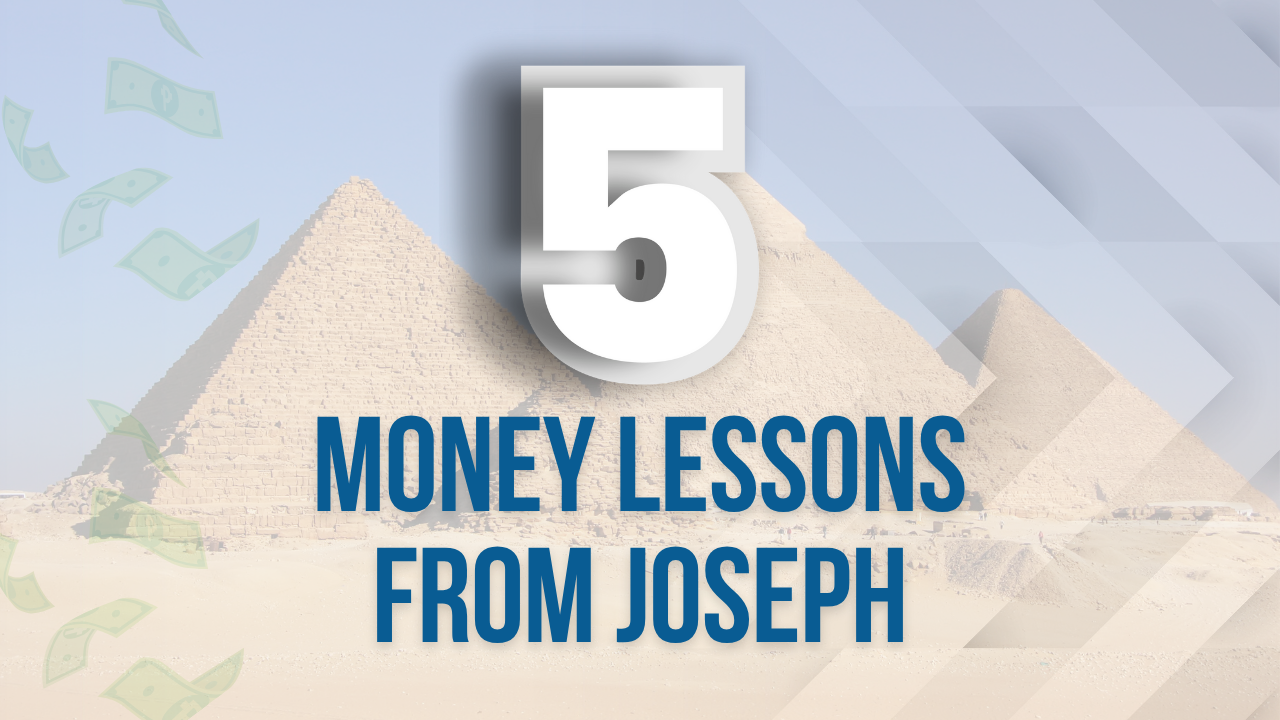Joseph's Journey: 5 Money Management Lessons
Jun 29, 2025
Written by Renate McDonald
Joseph is renowned for many things: his coat of many colours, his faithfulness, his dream interpretations, his infamous line, "What you meant for evil, God has turned for good", his forgiveness, and more. Today though, I want to focus on the lessons he taught us about resource management through his approach to the situations he faced.
Who was Joseph?
Joseph was the 11th son of Jacob (also called Israel), and he was greatly favoured. The Scripture tells us that "Israel loved Joseph more than any other of his sons, because he was the son of his old age. And he made him a robe of many colours" (see Genesis 37:3). Because of this favouritism, his brothers hated him and that hatred only grew when he shared the dreams he had about ruling over them.
This hatred and jealousy led the brothers to sell Joseph to some passersby (instead of killing him) and they smeared blood on his colourful coat to convince their father that Joseph was actually dead. The traders (Midianites) who bought Joseph took him to Egypt and sold him as a slave to Potipher who was an officer of Pharaoh.
In his time there, Joseph worked diligently and was trusted by Potipher to work in and manage his house. Potipher's wife however, had lustful desires towards Joseph. He rejected her and she had him falsely imprisoned. While there, he met king's cupbearer and baker who had dreams they could not interpret. Joseph accurately interpreted both. The cupbearer returned to the service of the king and Joseph asked that he "do me the kindness to mention me to Pharaoh, and so get me out of this house".
Two years later, Pharaoh had two dreams that no one could interpret. It was then that the cupbearer remembered Joseph. Again, Joseph accurately interpreted the dreams as God revealing to Pharaoh what He was about to do - seven years of abundance followed by seven years of famine. Based on this, Pharaoh believed that the Spirit of God was within Joseph, giving him the wisdom to discern the times. Pharaoh then set Joseph over all the land of Egypt to prepare for the times to come.
Joseph stored up 20% of all that was produced during the good years and managed that food as the reserves during the seven years of famine. During the time of famine, the Israelites had to purchase food from Egypt. They sold all they had to secure food - livestock, land, and eventually themselves as slaves. Joseph's brothers also came to purchase food, not even recognizing their brother. He ultimately sent them back for their father and youngest brother, revealed himself, forgave them and welcomed them to live under his care.
Read his full story in Genesis chapters 37 to 50.
What His Actions Taught Us
- Be faithful in every season: Even when Joseph seemingly had nothing, he did not forsake his relationship with God. He was faithful in the pit, the prison and the palace. God rewarded his faithfulness and consistency. There was no evidence in the text of Joseph doubting God or walking away from Him. He held fast to the promises because he knew that God would not leave nor forsake him. He stayed in position, even the uncomfortable ones, and continuously displayed godly character. When he had opportunity for adultery, he withstood imprisonment instead. When he had opportunity for vengeance against his brothers, he chose forgiveness. Joseph's story summarized above spanned 13 years of his life and throughout it, we witnessed examples of how to remain faithful to God in good times and bad.
- Seek godly wisdom: Joseph was able to interpret the dreams and prepare a plan based on divine wisdom and discernment. We must note that when it came to his own dreams in his younger years, Joseph may not have used great wisdom in how he communicated it to his family. However, as he matured through the trials of becoming enslaved to the Egyptians, his approach seemed to change. Though we were not told of any more of his dreams, his handling of the dreams of others with humility and care spoke to his developed character. Out of this, came the opportunity for him to use his gift for interpreting dreams through divine revelation to glorify God. Pharaoh himself recognized that it was God within Joseph that enabled him to clearly interpret the dreams. This gave Pharoah the confidence to set Joseph in charge of the land of Egypt. God is the ultimate source of discernment and wisdom. Stay connected to Him for direction and clarity in making decisions in your own life.
- Save during times of abundance: In deciphering Pharaoh's dream, Joseph noted there would be 7 years of plenty and 7 years of lack. Pharaoh put him in charge of managing Egypt during these times. During the 7 years of plenty, Joseph built storehouses in every city and stored 20% of everything that was harvested to prepare for the times of lack. In our own lives, some seasons will feel more abundant than others therefore, this saving 20% principle would be a good one to put in practice during the times of abundance so that you have enough during the times of scarcity. In very practical terms, 2020 hit just about everyone by surprise - the lockdowns, the scarcity, the deaths, the isolation, the financial strain, and everything in between. Some persons came out of that time deep in debt, while others exited on level ground. Those who had reserves in place, had a much better chance of surviving financially.
- Manage scarcity wisely: During the 7 years of famine, Joseph had to manage the stores well to ensure that it lasted. This was a great display of delayed gratification and forward thinking. While we may wrestle daily with our desire for instant gratification, it is vital that we assess our approach to spending during times of scarcity and allow ourselves to make sacrifices for the greater good.
- Preparation creates leverage: When the 7 years of scarcity began, Egypt had enough food stored to feed their people and others. Since others, namely the Israelites, did not store up food during the times of plenty, they had to purchase from the Egyptians. They eventually ran out of money, then livestock, then land, which meant that they resorted to selling themselves into slavery to the Egyptians just so they could eat. Joseph leveraged the food stores that were built up over the previous years to maintain and even build up the Egyptian nation. This may seem callous but if you think about it, the Egyptians and the Israelites both had the same 7 years of plenty before the famine came but only the Egyptians (due to Joseph's plan given through godly wisdom) stored up enough to carry them through the famine while still having enough to offer to the Israelites as a bargaining tool.
Overall, it should be noted that Joseph's approach to resource (wealth) management was not purely physical but also spiritual. He submitted himself to God for His will to be done through him and therefore, his plans and decisions were directed by God for a greater purpose.
As a bonus lesson: our finances are not separate from our spiritual lives.
1 Corinthians 10:31 tells us:
"So, whether you eat or drink, or whatever you do, do all to the glory of God."
Stewarding finances is no exception!

